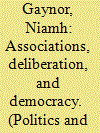| Srl | Item |
| 1 |
ID:
109155


|
|
|
|
|
| Publication |
2011.
|
| Summary/Abstract |
Over the past two decades there has been a burgeoning interest and research into experiments and innovations in participatory governance. While advocates highlight the merits of such new governance arrangements in moving beyond traditional interest group representations and deepening democracy through deliberation with a broad range of civic associations, critics express concern about the political legitimacy and democratic accountability of participating associations, highlighting in particular the dangers of co-option and faction. Addressing these concerns, a number of theorists identify an important role for civic associations in linking deliberations at micro policy levels to those within the public sphere more broadly. These normative contributions raise an important empirical question-does civic associational engagement at micro levels leave scope to engage both laterally across associations and vertically with members and citizens more broadly? More simply put, is civic associational engagement within micro-policy fora "good" for democracy more broadly? Drawing from a study of civic associational engagement in Ireland's national Social Partnership process over a ten-year period this article argues that, where deliberations become overshadowed by more traditional communicative norms of bargaining and negotiation, it is not. Evidence is presented from the Irish case to show how civic actors, having internalized the dominant communicative norms of the process, have contributed toward a narrowing of the deliberative space within, but most particularly outside, this process. This, it is argued, has resulted in a considerably weakened public sphere with neither the institutional apparatus nor the discursive capacity to seek accountability from political and civic leaders at a time of profound crisis within the Irish state.
|
|
|
|
|
|
|
|
|
|
|
|
|
|
|
|
| 2 |
ID:
105366


|
|
|
|
|
| Publication |
2011.
|
| Summary/Abstract |
Member-based civic associations, or citizen groups, have two crucial roles in American democracy. They advocate for members' interests in the public arena, but also operate as Tocquevillian "schools of democracy" linking citizens to politics and equipping them with the skills of democratic citizenship. Yet scant research has examined the interrelationships of these two roles. Does the work that civic associations do in developing democratic participants enhance the work they do advocating for members' interests in the public arena? We bring together two previously disparate strands of research on civic associations by arguing that a key factor affecting the political presence of civic associations is leadership quality. We focus on the relationship of leadership quality to political presence, using data from a unique 2003 study of 226 local entities of the Sierra Club. We show that organizations with more skilled and committed leaders have higher levels of political presence. This contrasts with previous research that has focused primarily on community context and resources as explanatory factors. This study shows that political presence is related to the extent to which leaders develop their skills and demonstrate commitment to the organization.
|
|
|
|
|
|
|
|
|
|
|
|
|
|
|
|